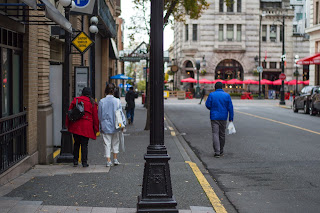A Tale of Representation without Taxation: Victoria Municipal Governance
It is a rather curious thing that property taxes are generally included in the rent. At first blush it would seem innocuous enough, it would seem that anything otherwise would be preposterous - after all, renters are comparatively disadvantaged while property owners are comparatively advantaged. Property owners have had enough good fortune to put aside enough for a downpayment and are also well enough off to have enough income to cover the mortgage should they require one. Surely, it is only fair that the liability for the property tax accrue to the owner of the property.
Except, this leads to rather curious results, particularly when rents and tenancy are controlled - as they are in British Columbia, where renters then become immune to the spending decisions of their municipal government. Renters, as residents, are entitled to vote in municipal elections (as they should be), and are still full beneficiaries of the services provided by municipal governments - including policing, local road maintenance, garbage pick up, parks, and libraries but are insulated from the spending decisions of municipal governments. Further, the value of the property largely dictates the share of property taxes owing - with more valuable properties generally commanding larger property tax bills. Generally speaking, in communities where renters are not a large share of those who are able to vote, this likely has little impact on election outcomes - however, in places where the majority of voters are renters, there is clearly opportunity for dysfunction to flourish.
Perhaps, the liability for property taxes ought to accrue to the occupier of the property rather than the owner of the property - after all, it is the resident occupier (regardless of their tenure) who benefits from the expenditures made at the municipal level. It is the resident who enjoys the parks. It is the resident who cares about their neighbourhood. It is the resident who uses the local schools. It is the resident who attends the local festivals - and lastly, it is the resident who votes for the municipal council.
So if property taxes were the resident occupier's direct liability, in the same way the electric bill is what would happen?
First, there'd be an incredible incentive for property owners to find occupiers for their properties. After all, the easiest way to avoid property taxes then, would be to not allow the property to remain vacant, as during periods of vacancy the liability would revert to the property owner.
Secondly, rents would drop - in some cases dramatically so, as the risk associated with cost increases beyond the property owner's control (ie. property taxes) is reduced. Owner's currently price their properties according to what the market will bear - so if a 1 bedroom unit can command $1500, that is the ask, and as part of this ask property tax is included, as is some premium for risk. If property tax were excluded from the rent, market rent is still $1500 including property taxes, so if property taxes on a unit are $100 per month, the rent asked by the landlord is now $1350, with the tenant paying the taxes directly at a rate of $100 per month and no longer paying the $50 premium for cost risk. The net impact is a reduction in market rent demanded.
Third, voter turn among residents (and particularly among renters) out would improve. Because resident occupiers (regardless of tenure) would be liable for property taxes, they are more motivated to vote carefully because there is a consequence to voting. Voting for a council that is likely to engage in profligate spending would mean direct increases to a person's cost of living, regardless of occupancy tenure. Currently, in places where renters are the majority of potential voters municipal governments can promise unrealistic programs and services, while placing the burden of paying for those programs and services on people who may not even be able to vote in the municipality.
Lastly, there may be better land use decisions as keeping high value land relatively vacant becomes uneconomic. Land that is likely to have high development values becomes unattractive to tenants (as the property tax increases are risky), and so rather than remaining undeveloped, the land gets developed in such a way that there is little opportunity to improve upon its use.
Currently, a land owner may be taxed but not able to vote in the municipality in which they hold land (each person is rightfully entitled to one vote, and most choose to vote in the municipality in which they live) - taxation without representation. Further, a renter may vote but not taxed accordingly as the property tax is the owner's liability - representation without taxation. The end result: poor governance.

Renters usually do wind up paying the taxes on properties they rent - - indirectly, since landlords use rental income to cover all their business costs, including taxes.
ReplyDeleteIndirectly many rentals also pay for water and heat, and many landlords have decided that direct payment of those bills is better as they are beyond the control of the property owners.
Delete